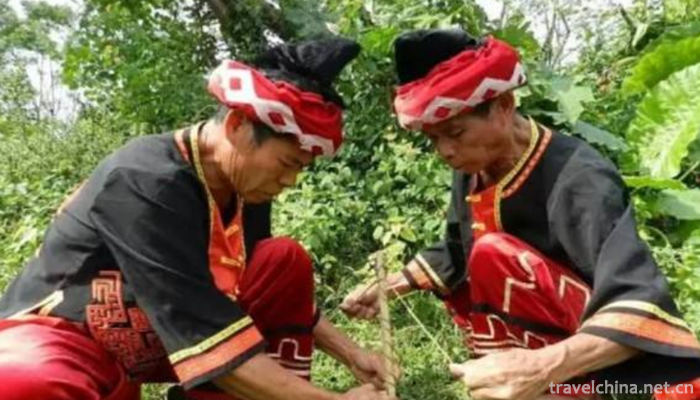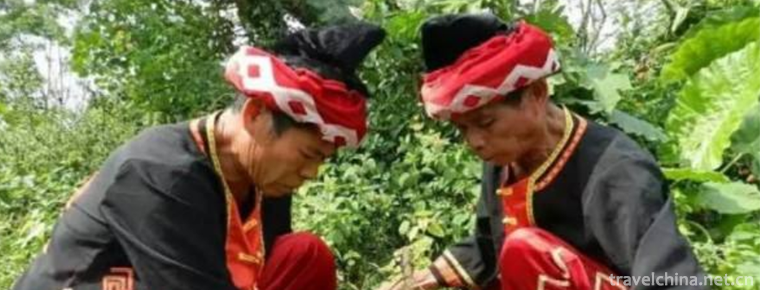Li Nationalitys Wood Drilling and Fire making Techniques
Li Nationalitys Wood Drilling and Fire making Techniques
Li people's wood-drilling and fire-making skills, Hainan Province's local traditional handicraft, one of the national intangible cultural heritage.
When the technique is used to make fire, the drill rod is inserted into a small hole with the foot on the drill fire board, and the drill rod is rubbed by both hands, so that the mechanical energy can be turned into heat energy to generate Mars, which falls down along the trough and ignites the ignition. When the igniter smokes, the air is blown quickly to assist the ignition, which leads to the fire.
In 2006, the technology of drilling wood and making fire of Li nationality was approved by the State Council and listed in the first batch of national intangible cultural heritage list, number: _-87.
historical origin
According to historical records, about 3000 years ago during the Shang and Zhou Dynasties, the ancestors of the Li Nationality had settled in Hainan Island. Until the Ming Dynasty, the Li Nationality was still distributed throughout the island. During the Song, Yuan, Ming and Qing dynasties, with a large number of Han people from the mainland migrating to Hainan, the phenomenon of ethnic assimilation and migration in the island became more and more serious. A small number of Li people from the northern part of the island moved southward, most of them assimilated into the Han people. Today, Li people mainly live in the central and southern part of Hainan Island. It is in this hot soil of Hainan Island that the Li people have experienced a long history of accumulation and gradually formed their own unique culture. It is in this unique culture that the ancient skill of drilling wood and making fire has been spread to this day.
Lizu's wood-drilling and fire-making skills are mainly preserved in Sanya, Wuzhishan, Dongfang and other cities in the south-central part of Hainan Island, as well as Li's agglomeration areas in Qiongzhong, Baoting, Lingshui, Ledong, Changjiang and Baisha counties.
Process characteristics
producer
Lizu's wood-drilling and fire-making is one of all kinds of artificial fire-making techniques in ancient times, which has distinct regional characteristics. According to the production custom of Li nationality, the ignition of pottery must be carried out in the way of "drilling wood to make fire". Because it takes a lot of endurance to drill a wooden pole out of Mars, women can't do it, and weak old men can't do it.
Skill
In order to make the invisible Mars become a vigorous flame, one must have a medium, that is, to ignite it with flammable corduroy, banana root fiber, kapok and so on, and to lose the opportunity of oxygen transfusion, in order to achieve the purpose of fire.
Technological process
Lizu wood-drilling and fire-making tools are composed of fire-drilling board and drill pipe (or bow wood). The fire drill board is cut with soft numbness, generally 35 cm long, 7-10 cm wide and 3-5 cm thick. On one side of the fire drill board, a number of small holes are dug, and the bottom of the holes is a flowing ash trough, from which Mars falls. Drill pipe (or bow) is 50-60 cm long, made of hard miscellaneous wood, 3-5 cm in diameter, with a slightly pointed lower end, such as a cone. In addition, corduroy, banana root fiber, kapok and so on are used as ignition materials. When the fire is started, the drill pipe is inserted into a small hole with the foot on the drill fire board, and the drill fire rod or bow is rubbed by both hands, so that the mechanical energy can be converted into heat energy, resulting in Mars. Mars fell down the trough and ignited the ignition. When the igniter smokes, it is quickly picked up and blown for combustion, which leads to fire.
Inheritance and protection
Inheritance value
Lizu's drilling wood for fire has archaeological and historical value. As a cultural relic, the drill board, the drill rod or the bow wood can not speak. It is a kind of dead fossil. It is difficult to explain the process of drilling wood to make fire by these data alone. This can only be helped by the relevant ethnological materials as "living fossils".
Inheritance status
Nowadays, the necessity of drilling wood to make fire has long ceased to exist. There are not many people who know this skill. These old folk artists still have the method of drilling wood to make fire, and they need to take measures to rescue and protect it urgently.
Inheriting characters
Wang Zhaoliang, male. In May 2018, he was selected as the representative successor of the fifth batch of national intangible cultural heritage projects and declared by Baoting Li and Miao Autonomous County, Hainan Province. Project Name: Lizu wood drilling and fire technology.
protective measures
In May 2018, the Campus Tour of the intangible cultural heritage of Hainan Province was held in Baoting Middle School. The students of Baoting Middle School in Baoting Li and Miao Autonomous County learned the skills of drilling wood and making fire.
social influence
Important exhibition
In June 2015, Baoting held a "Baoting Li and Miao Autonomous County intangible cultural heritage exhibition activity" in the Penang Valley scenic spot, in which the Li people's wood drilling and fire-making skills were displayed.
In October 2015, Baoting held a "Tour Exhibition of Traditional Techniques of Non-material Cultural Heritage" in Yanoda Scenic Area, in which the drilling and fire-making skills of Li nationality were displayed.


-
1.Qibugou Scenic Area
Qibugou Scenic Area is located in Wu'an Huoshui Township, Handan City, Hebei Province. Wu'an National Geological Park and the hinterland of the National Forest Park, Hebei Province
Time 2018-12-17 -
2.Badachu Park
Located at the south foot of Beijing's famous Xishan scenic spot, Badadu Park is a national AAAA-level scenic spot. It is the first batch of key cultural relics protection units in Beijing after the f
Time 2018-12-24 -
3.Tianmujiang Beishuicheng Hot Spring Resort
Tianmu Jiangbeishuicheng Hot Spring Resort is the third five-star resort hotel developed by Tianmu Group in Guanxian County of Shandong Province after Tianmu, Lushan Hot Spring Resort of Jiangxi Provi
Time 2019-02-21 -
4.Carpet Weaving Techniques
Uygur carpet is a handicraft with a long history and tradition. It integrates painting, sculpture, knitting, embroidery, printing and dyeing. Characteristic
Time 2019-04-26 -
5.Legend of Filial Women in the East China Sea
The filial woman in the East China Sea is an ancient folklore story. Her real name is Zhou Qing. It comes from Biographies of LieNu and Biographies of Yu Dingguo.
Time 2019-04-27 -
6.Sacrifice Aobao
Aobao sacrifice is a traditional custom of Mongolian people, and one of the manifestations of prairie people's natural worship. Xilinguole League is a relatively complete
Time 2019-05-05 -
7.Longkou Fans Traditional Handicraft Production Techniques
In the late Ming and early Qing Dynasties, Zhaoyuan people created a new technique of making mungbean vermicelli, which was divided into three manual operation processes: powder pushing, powder leakin
Time 2019-05-14 -
8.Miao Sister Festival
Miao Sister Festival, also known as "Sister Rice Festival", is a traditional festival of Miao people in Laotun and Shidong areas of Taijiang County, Guizhou Province. It is held from March 1
Time 2019-06-05 -
9.Adjustment and suspension
Lifting is a unique folk sports event in Shaoxing City, Zhejiang Province. Appeared in the middle and late Qing Dynasty, the tuning and hanging actors were named "tuning and hanging" because
Time 2019-06-21 -
10.Xingyiquan
Xingyiquan, also known as Xingyiquan, is one of the traditional Chinese boxing. Although there are different opinions on its origin, Ji Jike (1602-1680), a native of Puzhou, Shanxi Province, was widel
Time 2019-07-08 -
11.Qingyang Palace
Qingyang palace is located in the second section of the first ring road in Chengdu, Sichuan Province. It is known as "the first Taoist temple in Western Sichuan" and "the first jungle in Southwest China". It is also one of the famous Taoist temples in China.
Time 2020-11-05 -
12.Land resources in Suining
The total cultivated land area of Suining is 2.2815 million mu, of which the purple soil area is the largest, accounting for 62% of the cultivated land area, which is widely distributed in the low mountain and hilly areas.
Time 2020-12-16